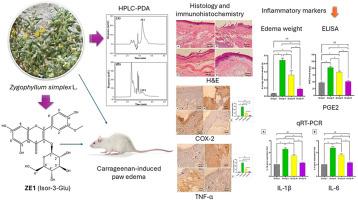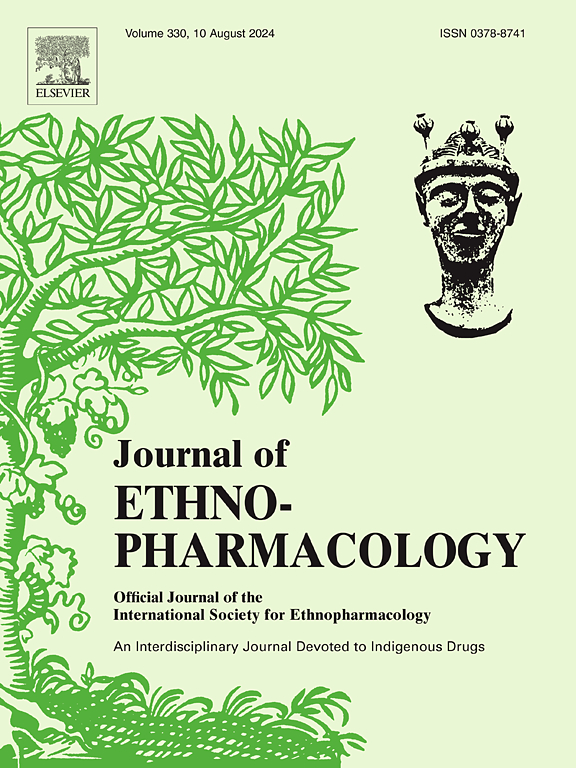单叶连翘中异鼠李素-3-O-β-D-葡萄糖苷的 HPLC-PDA 和体内抗炎潜力
IF 4.8
2区 医学
Q1 CHEMISTRY, MEDICINAL
引用次数: 0
摘要
民族药理学意义:炎症是对损伤做出反应的一个生物过程,会导致血流改变、血管通透性增加、组织破坏以及活性氧(ROS)和炎症介质的产生。单叶连翘(Zygophyllum simplex L.)是阿拉伯半岛传统上用于治疗炎症性疾病的药用植物,由于其酚类物质含量高,已在体外显示出良好的抗炎活性。此外,乙酸乙酯馏分也显示出显著的体内抗炎效果:本研究旨在评估单叶泽兰植物提取物及其主要乙酸乙酯分离物异鼠李素-3-O-β-D-葡萄糖苷(Isor-3-Glu)的体内抗炎作用。本研究旨在开发一种简单、稳健的高效液相色谱法,用于定量分析单叶泽兰甲醇总提取物中的 Isor-3-Glu:材料和方法:用多种有机溶剂对单叶泽兰的甲醇提取物进行分馏,然后用乙酸乙酯馏分在 Sephadex LH-20 柱上分离出 Isor-3-Glu。利用卡拉胶诱发的大鼠炎症对其体内抗炎活性进行了研究。通过 qRT-PCR 和 ELISA 分析了组织学特征以及环氧化酶-2 (COX-2) 和肿瘤坏死因子-α (TNF-α) 的免疫组化表达,并分别检测了爪组织中白细胞介素 (IL-1β 和 IL-6) 以及前列腺素 E2 (PGE2) 的水平。采用 HPLC-PDA 方法对 Isor-3-Glu 进行定量:结果:Isor-3-Glu(pConclusion:结论:Isor-3-Glu 是一种很有前景的抗炎化合物,需要在未来进行临床研究。采用精心开发和优化的 HPLC-PDA 技术对 Isor-3-Glu 进行了精确定量。本文章由计算机程序翻译,如有差异,请以英文原文为准。

HPLC-PDA and in vivo anti-inflammatory potential of isorhamnetin-3-O-β-D-glucoside from Zygophyllum simplex L.
Ethnopharmacological relevance
Inflammation is a biological process in response to injury, resulting in altered blood flow, increased vascular permeability, tissue destruction, and the production of reactive oxygen species (ROS) and inflammatory mediators. Zygophyllum simplex L., a medicinal plant traditionally used in the Arabian Peninsula for inflammatory disorders, has demonstrated promising in vitro anti-inflammatory activity due to its phenolic content. Additionally, the ethyl acetate fraction has exhibited notable in vivo anti-inflammatory effects.
Study objective
This research aimed to evaluate the in vivo anti-inflammatory effects of a Z. simplex plant extract and its principal ethyl acetate isolate, isorhamnetin-3-O-β-D-glucoside (Isor-3-Glu). The study seeks to develop a straightforward and robust HPLC method for quantifying Isor-3-Glu within the total methanolic extract of Z. simplex.
Materials and methods
The total methanol extract of Z. simplex was successively partitioned with a variety of organic solvents and the ethyl acetate fraction was used to isolate Isor-3-Glu on a Sephadex LH-20 column. The in vivo anti-inflammatory activity was investigated using carrageenan-triggered inflammation in rats. Histological features and immunohistochemical expression of cyclooxygenase-2 (COX-2) and tumor necrosis factor-alpha (TNF-α) were analyzed, and the levels of interleukins (IL-1β and IL-6) as well as prostaglandin E2 (PGE2) of the paw tissues were examined by qRT-PCR and ELISA, respectively. Quantification of Isor-3-Glu was achieved using an HPLC-PDA method.
Results
Isor-3-Glu considerably (p < 0.05) lowered the weight of the paw edema. The histological abnormalities were improved, and the percentage of the COX-2 and TNF-α immunoreactive cells substantially decreased in the Isor-3-Glu-treated group in comparison with the positive control and Z. simplex extract group. Isor-3-Glu significantly ameliorated PGE2, IL-1β, and IL-6 levels. A straightforward and dependable HPLC technique was established for quantifying Isor-3-Glu in the total extract. The proposed methodology effectively determined Isor-3-Glu in less than 5 min. The calibration curve exhibited a linear relationship over the concentration range of 1.0–40.0 μg/mL, with a correlation coefficient (r) ≥ 0.9995. The developed method demonstrated a high level of sensitivity, with a detection limit as low as 0.139 μg/mL. The concentration of Isor-3-Glu in the total extract of Z. simplex was determined to be 0.05% w/w of dry extract.
Conclusion
Isor-3-Glu could be considered a promising anti-inflammatory compound that necessitates future clinical research. Isor-3-Glu was accurately quantified using a meticulously developed and optimized HPLC-PDA technique.
求助全文
通过发布文献求助,成功后即可免费获取论文全文。
去求助
来源期刊

Journal of ethnopharmacology
医学-全科医学与补充医学
CiteScore
10.30
自引率
5.60%
发文量
967
审稿时长
77 days
期刊介绍:
The Journal of Ethnopharmacology is dedicated to the exchange of information and understandings about people''s use of plants, fungi, animals, microorganisms and minerals and their biological and pharmacological effects based on the principles established through international conventions. Early people confronted with illness and disease, discovered a wealth of useful therapeutic agents in the plant and animal kingdoms. The empirical knowledge of these medicinal substances and their toxic potential was passed on by oral tradition and sometimes recorded in herbals and other texts on materia medica. Many valuable drugs of today (e.g., atropine, ephedrine, tubocurarine, digoxin, reserpine) came into use through the study of indigenous remedies. Chemists continue to use plant-derived drugs (e.g., morphine, taxol, physostigmine, quinidine, emetine) as prototypes in their attempts to develop more effective and less toxic medicinals.
 求助内容:
求助内容: 应助结果提醒方式:
应助结果提醒方式:


